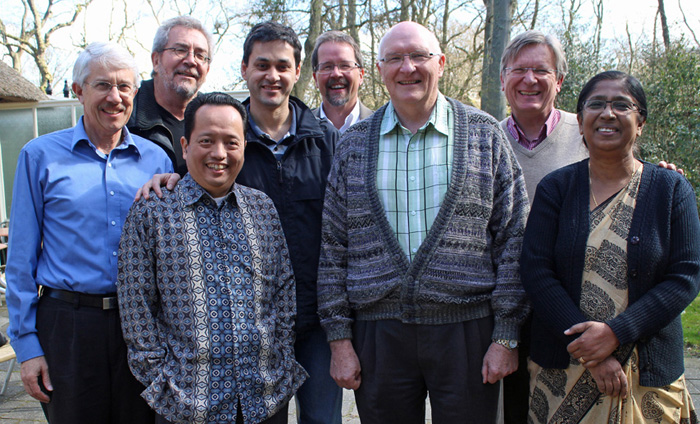Schoorl, Netherlands – From 19-24 March, leaders and members of the four Mennonite World Conference Commissions met together for a time of face-to-face discussion, reflection, worship and strategic planning to advance the mission of MWC.
It was only the second such meeting of the four Commissions since their formation in 2009. They last met face-to-face in Switzerland in 2012, prior to the MWC General Council meeting.
Approximately 50 women and men from around the globe gathered for the five-day meetings, convened at the Mennonite Conference Centre Doperaduin, one of three retreat centres run by the Algemene Doopsegezinde Sociëteit (Dutch Mennonite Church).
Resources for dealing with conflict
For the Peace Commission, meetings focused on building their web-based “Manual of Resources for Dealing with Conflict,” an umbrella set of resources under which the Commission plans to place a variety of specific tools, documents and other materials related to conflict transformation, reconciliation and trauma healing. One resource already under this umbrella is “Guidelines for Determining MWC Response to Internal Conflicts of Member Churches.” It is available on the Peace Commission page on the MWC website (www.mwc-cmm.org) and has been translated into English, Spanish and French.
During the March 2014 meetings, the Commission worked on a second resource, “Reconciling Our Perspectives, Restoring Our Relationships: Dialogue and Understanding Within Mennonite World Conference.” The document provides guidelines for dealing with interpersonal and inter-group conflict within the MWC community. A draft version of this document is currently being refined and reviewed.
All resources currently being developed by the Commission fall into one of three categories: pre-conflict, conflict, and post-conflict. Conflict materials are intended for use by congregations, conferences or other groups currently in the midst of disputes or disagreements. Post-conflict materials are focused on healing after conflict and dealing with “legacy conflicts,” such as past conflicts that were never fully resolved. Pre-conflict materials provide capacity-building resources used to identify and plan for resolution of future discord.
A theology of mission
The Mission Commission focused their attention on drafting a key resource document: an Anabaptist theology of mission. The draft will be presented to the Global Anabaptist Service Network and Global Mission Fellowship, both of which function under the umbrella of the Mission Commission, for review. Finally, the document will be presented to the MWC General Council for approval and adoption.
The Mission Commission also spent time further outlining their plan for a Global Association of Anabaptist Missiologists. This body would have a three-fold purpose: (1) to provide intercultural fellowship among Anabaptist missiologists worldwide; (2) to practice corporate, disciplined reflection on missions from an Anabaptist perspective; and (3) to create Anabaptist vision and perspectives on mission that are truly global in scope and content.
Koinonia delegations and Global Anabaptist Deacons
The Deacons Commission affirmed or re-affirmed two key initiatives – the regular rotation of Koinonia delegations, and the Global Anabaptist Deacons program – and spent time planning each.
In affirming a regular rotation of Koinonia delegations to Latin America, Africa and Asia (respectively), the Commission returns to a plan established in previous meetings. Though planned earlier, implementation was delayed by logistical problems and more pressing visits. The Commission hopes to put this rotation into place after making decisions about the size of delegations and the financing of visits.
Finally, the Commission strategized for a potential re-launch of the Global Anabaptist Deacons (GADs) program. Their plan is to recruit GADs from each continental region in which MWC has member churches. GADs serve as the “eyes and ears” of the Deacons Commission in their respective regions, and communicate to the Commission situations that require attention. GADs will also inform their churches about global church prayer requests.
Learning from ecumenical dialogues
Finally, the Faith and Life Commission continued to work on and/or oversee a number of projects, including the Global Anabaptist Profile, the Bearing Witness Stories Project, and ecumenical dialogues with Catholics, Lutherans and Seventh-Day Adventists.
With regard to ecumenical dialogues, the commission devoted much of its time in Schoorl to discussing ways to bring the results of these conversations to bear within Anabaptist-Mennonite congregations and educational institutions. Earlier in 2014, the Commission circulated a letter (now available on the Faith and Life Commission page at www.mwc-cmm.org) encouraging Anabaptist-Mennonite educators to a new paradigm for teaching Lutheran-Anabaptist history, one that reflects the recent reconciliation between the two traditions.
The Commission also identified future dialogue partners, including Pentecostals.
In addition, much of the Commission’s time together centred on planning for a Global Educators Conference, scheduled for the 2015 assembly in Harrisburg, Pennsylvania, USA. This gathering is being jointly sponsored by the International Community of Mennonite Brethren (ICOMB) and Mennonite Education Agency of Mennonite Church USA.
Joint meetings bring spiritual enrichment
In addition to these business sessions, joint meetings for fellowship and spiritual enrichment also played a key role in the Schoorl gathering.
Joint sessions were held in the mornings and evenings. Morning meetings included a devotional time led by a Commission member. Evening sessions involved prayer led by a Commission officer. Additionally, on Sunday, 23 March, leaders and members visited area churches and took part in historic Mennonite walking tours.
While “the main goal of this meeting was planning and administration,” according to Danisa Ndlovu, additional emphasis was put on team-building among the various Commissions. This, he concludes was a major success of the gathering.
Adds César García, MWC general secretary: “We shared not only business matters with each other, but real friendships began to form as well. It felt like a family reunion.”
-Devin Manzullo-Thomas, with additional reporting by Janneke Leerink
